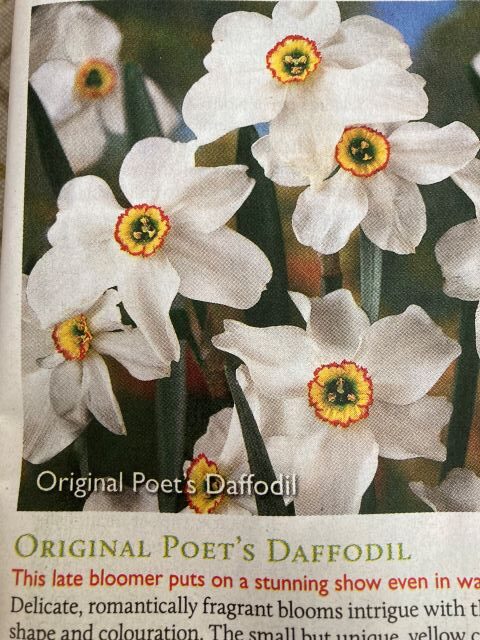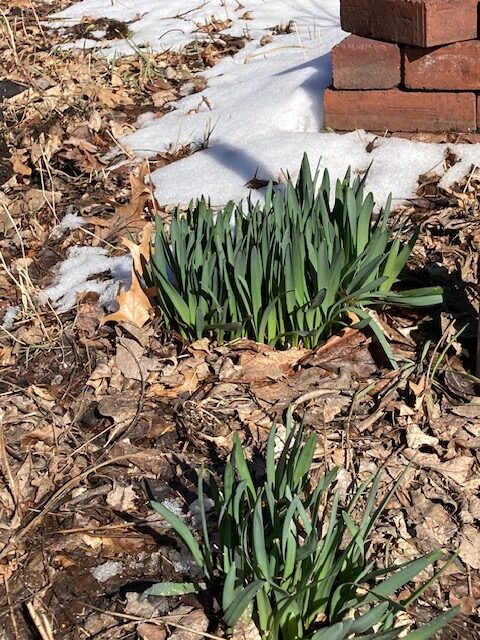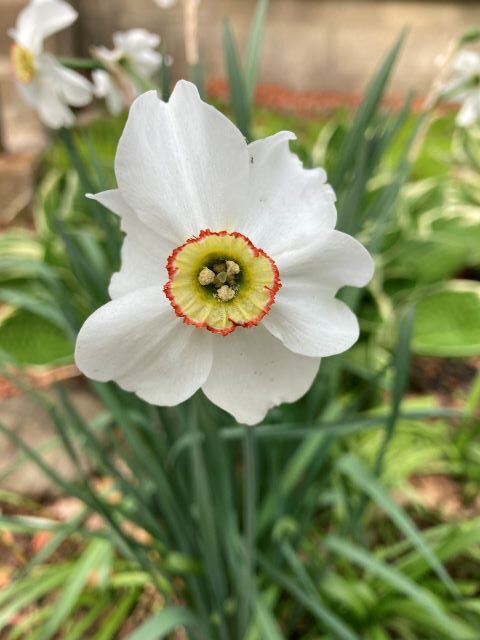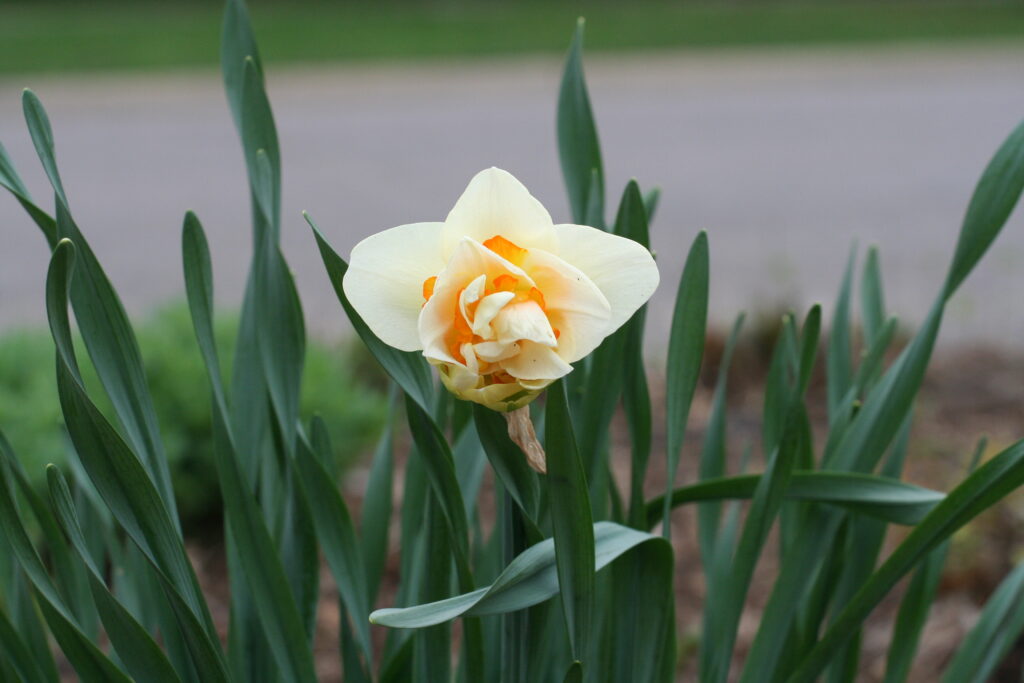



In April, the advance of spring in my corner of the world is undeniable and unstoppable. Spring is the time of year most rife with possibility, and this makes it the perfect time to celebrate poetry across the nation and across the globe.
As with all beginnings, at any starting place, things are patchy and iffy. That is as true of the natural landscape as it is the start of something made of language. Now, in our garden, there are hopeful spears rising but few actual blooms. By the conclusion of April, the land will be transformed, not unlike the way a blank piece of paper can be transformed into a poem.

As longtime readers know, I enjoy commiting the work of other poets to memory. Memorizing poems feels to me like money in the bank, like golden coins in my hands. The only hitch is that they don’t stay shiny in the mind forever. They need to be polished up from time to time. Above is the poem I am buffing up in my brain currently. I keep it in my wallet, and it accompanies me everywhere, making odd moments of waiting (or pedaling on the exercise bike at the Y) much more pleasant. Once it is fully reinstalled–no hesitations–I will replace it with another (slightly tarnished) poem companion.
William Wordsworth, the author of my current focus, has an indelible place in the history of English langauge poetry. He was a primary developer of the Romantic school of thought, that reaction against the rationalism and arch wit of the Enlightenment. Prizing the natural world and, accordingly, what they deemed more natural diction, Romantic poets created poems that served as an important corrective to the overly cerebral and codified aesthetics of the Eighteenth Century. The tenets of Romanticism–including the celebration of the sublimity of the natural world (of which humans are a part), the centrality of individuality and personal insight and emotion, the overturning of perceived tyrrany of overly rational and systematized thought and practices, and the inclusion of spiritual and supernatural elements–permeate Wordsworth’s poetry. They also remain a continuing and important stream in contemporary poetry, if not always one that is recognized or overtly embraced.

Here is a clearer copy of his poem, “I Wandered Lonely as a Cloud,” (often referred to simply as “Daffodils.”)
I wandered lonely as a cloud
That floats on high o’er vales and hills,
When all at once I saw a crowd,
A host, of golden daffodils;
Beside the lake, beneath the trees,
Fluttering and dancing in the breeze.
Continuous as the stars that shine
And twinkle on the milky way,
They stretched in never-ending line
Along the margin of a bay:
Ten thousand saw I at a glance,
Tossing their heads in sprightly dance.
The waves beside them danced; but they
Out-did the sparkling waves in glee:
A poet could not but be gay,
In such a jocund company:
I gazed—and gazed—but little thought
What wealth the show to me had brought:
For oft, when on my couch I lie
In vacant or in pensive mood,
They flash upon that inward eye
Which is the bliss of solitude;
And then my heart with pleasure fills,
And dances with the daffodils.
Wordsworth, (April 7, 1770 to April 23, 1850) lived a long time, enough time to transform from a fiery radical youth entranced by the French Revolution into the very figurehead and emblem of tradition when he was named Poet Laureate in 1843 by a then-young Queen Victoria. Even in his own day, his stock rose and fell as fashions changed. Sic fugit gloria mundi? Perhaps. Today, though, he is still read and is perennially influencing new work, even if his diction now can seem less natural than it did to his own ear, even if it sometimes seems to invite parody.
(I sometimes mentally rewrite some of his last stanza like this: “For oft when on my couch I lie/in vacant or in pensive mood/I watch t.v. and give a sigh/and dream of cheesy comfort food.” But I digress!)
For me, despite my occasional irreverence, this poem never fails to exalt my spirits when they flag (especially during the long grey Minnesota winter days.) Wordsworth reminds me that there is great beauty always there, if I just look up and out or if I still my surface thoughts enough to drop deeply into my own recollected experience. And, yes, think of this poem whenever I see daffodils. This poem, in particular, always reminds me that spring is immortal. There is no stopping it. And every time it arrives, it is thrilling and brand new.

Thank you for sharing this month of posts with me, and for sharing your month with poetry!
LESLIE



I know! I feel the same way…it does seem that we have been friends forever, but actually only a few years so far! It is a good thing we have many years ahead!
I love this. Your comments always bring poetry to life for me. And a book of your first poems? Made me smile and feel giddy. I wish I had known that little girl.
Oh, that is a gem! I will start reciting it to myself today. (Rain and wind expected!)
I look forward to your posts this month, and your photos. I don’t think I ever heard of the Poet’s Daffodil. While in the MFA program, I enjoyed Wordsworth a lot. Lately, I’ve neglected him. Thank you for reminding me of why I admired his work.
Lately, maybe because of poetry month, I’ve been reciting Western Wind.
Hi Jeanie! How lovely to know another poetry-minded person who has memorized this gem. When next our paths cross, let’s see if between the two of us with can recite the whole of it!
Yes! Spring is advancing, in fits and starts, and soon the pollinator meadows will resurge!
Are the daffodils with you in Switzerland now?
Thank you Leslie for providing these posts and your thoughts and insights. Today’s poem is a favorite of mine, one that I too have memorized, but need to brush up on. It’s perfect for a rather dreary spring day!
A wonderful post, Leslie, on this gray day here that is the best day of a week predicted to have wet heavy snow! So this lifted my spirits and will carry me through until SPRING takes her firm claim around me!
Thanks for this and looking forward to more!
Such a precious gift!